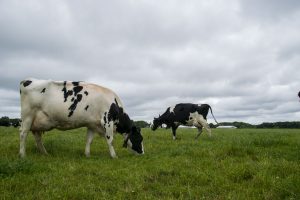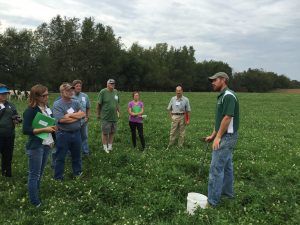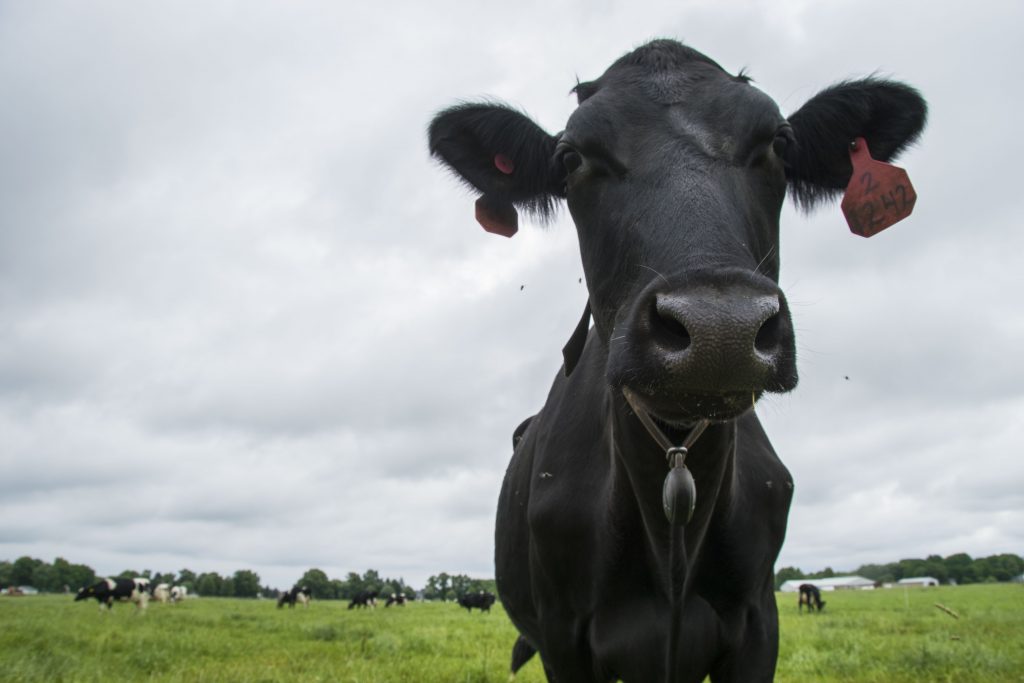According to data from the United Nations, livestock generate 14.5% of global greenhouse gas emissions, and cattle are responsible for more emissions than any other livestock species.
Using rotational grazing is one way livestock farmers can do their part to decrease those emissions, while saving money on feeding their herds.
“It’s hard to be a small dairy farmer these days,” said Brook Wilke, Farm Manager for the W.K. Kellogg Farm. “The prices are horrible, so you have to adapt by increasing the quality of your product, or reducing your costs, and grazing is one way to do both.”
Grazing cows on pasture decreases not only the economic cost of feeding cows, but also the environmental costs often associated with conventional management. When the feeding quality and efficiency of a herd of cows is improved, farmers are doing themselves and the environment a huge favor.
Cows produce methane (CH4) during their digestive process, and decomposing manure generates both methane and nitrous oxide. While livestock like cattle produce a great deal of greenhouse gases, the grasslands they graze on also have the capacity to store those gases and prevent them from being redistributed into the air.
If cows are left to graze one area of pasture continuously, they can eat the grass down to the ground, disturbing stores of carbon. If cows are rotated between different areas of pasture, then those stores can remain intact, halting further emissions from those sources.
Rotational grazing allows cows to get the nutrients they need and maintains the health of the grass and soil over the long term, all while keeping carbon in the ground instead of releasing it into the atmosphere. With a rotational grazing system, there’s less need to feed cows grain or artificially fertilize the grass.
One study found that farms participating in sustainable agriculture practices like rotational grazing produced 19% fewer emissions than non-participating farms in the first two years, dropping to 35% fewer emissions after participating for longer than two years.
The W.K. Kellogg Farm’s Pasture Dairy Center uses a rotational grazing strategy for its dairy herd.
“Because of our pasture management practices, we’re a carbon sink. We’re sequestering it, which is hard to do using conventional management practices,” said Howard Straub, KBS Pasture Dairy Center Manager.
Environmentally conscious livestock farming is possible, using methods like rotational grazing. The Pasture Dairy Center manages 240 acres of pasture, which is divided up into a variety of forage mixes, and different areas are used for research experiments and comparisons.
At the Farm, data-driven management is key. From rotating cows between paddocks based on measurements of available forage biomass to irrigating based on soil moisture data from electroconnectivity sensors, Straub and Wilke are on a mission to farm smarter and more sustainably.
Straub works directly with individual farmers who are interested in adopting similar strategies to those practiced at the Farm, and the Farm offers a variety of professional development programs for farmers, like Grazing School.
The Farm’s mission, set by W.K. Kellogg, is to “operate this farm under a most modern system of farm management so that it may serve as an object lesson to the people of the region in which it is located.” Through their conservation-minded management choices and outreach efforts, the Farm’s staff are doing exactly that.
For more information on the impacts of animal agriculture on climate change, visit the KBS LTER’s website for a variety of resources.




A legacy of conservation; a commitment to sustainability.
3700 E. Gull Lake Drive
Hickory Corners, MI 49060
(269) 671-5117
info@kbs.msu.edu